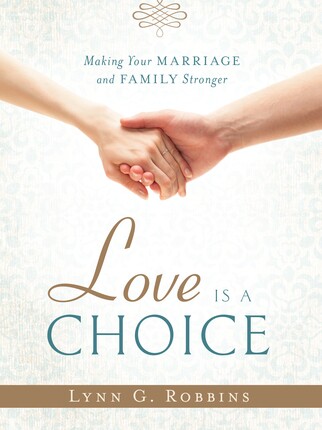Happily ever after is often considered the stuff of fairy tales but Elder Lynn G. Robbins, general authority emeritus for The Church of Jesus Christ of Latter-day Saints, says that love and happiness in most cases is a choice. On this week’s special Valentine’s Day episode of All In, Elder Robbins spoke with host Morgan Jones Pearson about his book, Love Is A Choice.
While we often talk at this time of year about the idea of falling in love, Elder Robbins spoke of the idea of falling out of love.
“Falling implies something accidental, something that you have no control over. And we tend to think of [it that way] because we use the phrases “falling in love“ [and] “falling out of love” as something that happens to you like being smitten with Cupid’s arrow. Something that is beautiful and wonderful, but over which we don’t have much say it’s something you fall in and out of. … It’s impossible to fall out of love if you have two willing parties,” Elder Robbins explained, sharing three doctrinal principles to support his hypothesis.
Subsequently, Elder Robbins explained that happily ever after is in most cases our choice as well.
Listen to the full episode in the player below or by clicking here. You can also read a full transcript by clicking here.
Morgan Jones Pearson: Elder Robbins, your book emphasizes that not only is love a choice, but anger is a choice. Taking responsibility is a choice. Developing Christlike attributes is a choice. But then you have a chapter about how choosing Happily Ever After is also a choice. You write, “The end is a fitting conclusion for dime novels and Hollywood love stories, but not for true love made perfect in Christ. This Pure Love is endless and is genuinely happily ever after.” How do you suggest that we all choose happily ever after?
Elder Lynn G. Robbins: Well, one, we talked about this a few minutes ago, how Paul said, “Husbands love your wives, even as Christ loved the Church.” And how did he love the Church? Well, that’s the pure love of Christ. And as we apply the pure love of Christ to our marriages, it suffereth long and it is kind—that is not only the best formula for a blissful, happy marriage in this life but forever. And knowing that we can choose to be happy, happiness itself to a great degree is a choice.
We learned that in the examples of Nephi, Laman, and Lemuel. … When you think of seeing the glass half full or the glass half empty, they had the same glass. They left Jerusalem together as a family. They went through the same hardships, hunger, thirst, and fatigue. And yet, when you read about how Nephi saw his glass, it was always not completely full, because he recognized the hardships, but he was happy. And they survived their journeys without murmuring as we read in 1 Nephi chapter 17. While Laman and Lemuel always saw their glass half empty, if not totally empty. And they said, this is an interesting verse in 1 Nephi 17:20, where they said, "Thou art like our father (referring to his foolish imaginations, etc.). It would have been better if we had died in Jerusalem better than to have suffered in the wilderness.” I mean they were pessimists, not optimists like Nephi.
I think it was the German poet Goethe who said, "We see in life what we carry in our heart, or we see life, not as life is but as we are." So, if you want to be happy, why not look for happiness because it will become a self-fulfilling prophecy? Laman and Lemuel were looking for mystery, and they were miserable. Nephi was looking for happiness, and he was happy. It becomes a self-fulfilling prophecy. So why not choose happiness and find it?
I believe that Jesus Christ was the happiest person ever to live because he was the greatest example of every Christlike virtue. Christian art through the centuries depicts him as downcast and a man appointed with grief but Elder Maxwell in talking about that Isaiah verse said that acquainted with grief referred more to Him taking upon Him our sins, our burdens, our grief, not to His day-to-day bearing. Can you imagine how excited He would be each morning to awaken knowing the impact He would have on many lives that day, bringing sight to the blind hearing to the deaf, helping the lame to walk, and performing miracles in so many other ways? I think He would have been the happiest person ever because joy and happiness are Christlike virtues. He would have been exemplary in those ways.


